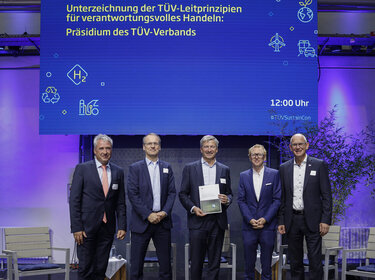Berlin, 21. February 2022 - Fair working conditions and better environmental and climate protection in the production and trade of goods around the world: these are the most important goals of the German and the planned European Supply Chain Act. A good one in two companies in Germany welcomes the national supply chain law (56 percent). Only 29 percent oppose the law and 15 percent do not yet have an opinion. These are the findings of a representative Forsa survey commissioned by the TÜV Association among 500 companies with 25 or more employees. "Most companies welcome legal regulations for more sustainability in a globalized economic world," said Dr. Joachim Bühler, managing director of the TÜV Association, at the presentation of the study. "The executives surveyed are aware of their corporate responsibility and are in favor of complying with due diligence requirements such as fair working conditions or protecting the environment and climate along their supply chains." However, it is also clear that this cannot be achieved by individual companies alone. Therefore, in the view of the respondents, the same requirements should apply to all competitors: Therefore, 83 percent of companies see the development of universally applicable standards for due diligence and 73 percent see the creation of a level playing field as the most important benefits of the Supply Chain Act. Likewise, 73 percent cite legal certainty as an important benefit of legal regulation. On the other hand, respondents fear high implementation costs (91 percent), disadvantaging smaller companies with fewer resources (86 percent) and disadvantages compared to competitors from third countries that do not have to comply with due diligence requirements (86 percent). Nearly four out of five companies say that due diligence compliance along the supply chain should be verified by independent bodies (78 percent). Bühler: "Certifications and independent on-site audits are important tools for building trust in each link of the supply chain."
According to the results of the survey, sustainable criteria play a major or very major role in shaping their supply relationships for just under half of the companies surveyed (49 percent). Large companies with 250 or more employees lead the way here with a share of 62 percent. "Small and medium-sized companies in particular often find it difficult to check compliance with social and ecological standards in the third, fourth or fifth stage of their supply chain. They lack the human and financial resources to do so," said Bühler. Still, one in three companies has realigned its supply chains in the past two to three years to integrate sustainability aspects (33 percent). For two out of three companies, this realignment was triggered by the Corona pandemic (67 percent), followed by disruptions in transport infrastructure (51 percent) and the consequences of climate change (36 percent). Bühler: "Crises such as the Corona pandemic and climate change should be a reason for companies to review existing supply relationships and take greater account of sustainability aspects in their business activities, even independently of legal requirements."
INDEPENDENT AUDITS CREATE TRUST AND FACILITATE IMPLEMENTATION IN PRACTICE
In Germany, the "Act on Corporate Due Diligence in Supply Chains" will come into force in 2023. It will initially apply to companies with 3,000 or more employees and, one year later, to companies with 1,000 or more employees. According to the survey, only 51 percent of respondents are aware that the law will come into force next year. Among large companies with 250 or more employees, the figure is as high as 73 percent. For the law to be implemented successfully, 86 percent of the companies surveyed call for suppliers to be certified so that they can demonstrate compliance with environmental and social standards. 83 percent are in favor of setting up a digital supply chain register in which the certification status of companies is recorded. And 77 percent want free advisory services, for example from chambers, trade associations or public institutions.
With a view to a European regulation, the TÜV association is calling for the same specifications for all companies in the EU as far as possible, regardless of their sector and size. "The aim is to achieve uniform competitive conditions and thus also to protect companies that want to comply with high social and ecological standards," Bühler said. In certain risk sectors, controls by independent auditing organizations should be enshrined in law. Risk sectors include, for example, the textile industry or the extraction of certain raw materials such as cobalt or coltan. Operating in conflict regions could also be a requirement for third-party audits. "Independent audits help to reliably document the stages of a product from raw material to processing to the store counter throughout the supply chain," Bühler said. The certifications should be recorded in a supply chain register and help companies evaluate and select suppliers.
"Sustainably operating companies benefit in many ways: they are less dependent on dwindling resources, enjoy a high reputation among investors and consumers, and are popular employers," Bühler emphasized. Last but not least, he said, they are better prepared for the transformation to a decarbonized economy. "Politicians must also promote sustainable business at other levels and set a good example," Bühler said. "In public procurement, for example, price should not be the sole criterion for awarding a contract, but sustainability aspects such as production conditions should also be taken into account."
Methodological note: The data is based on a representative survey conducted by the market research institute Forsa on behalf of the TÜV Association among 500 companies in Germany with 25 or more employees. Members of management, departmental and divisional managers, and buyers were interviewed by telephone.
To the study
"Sustainable supply chains - environmentally friendly, socially just, economically successful"




